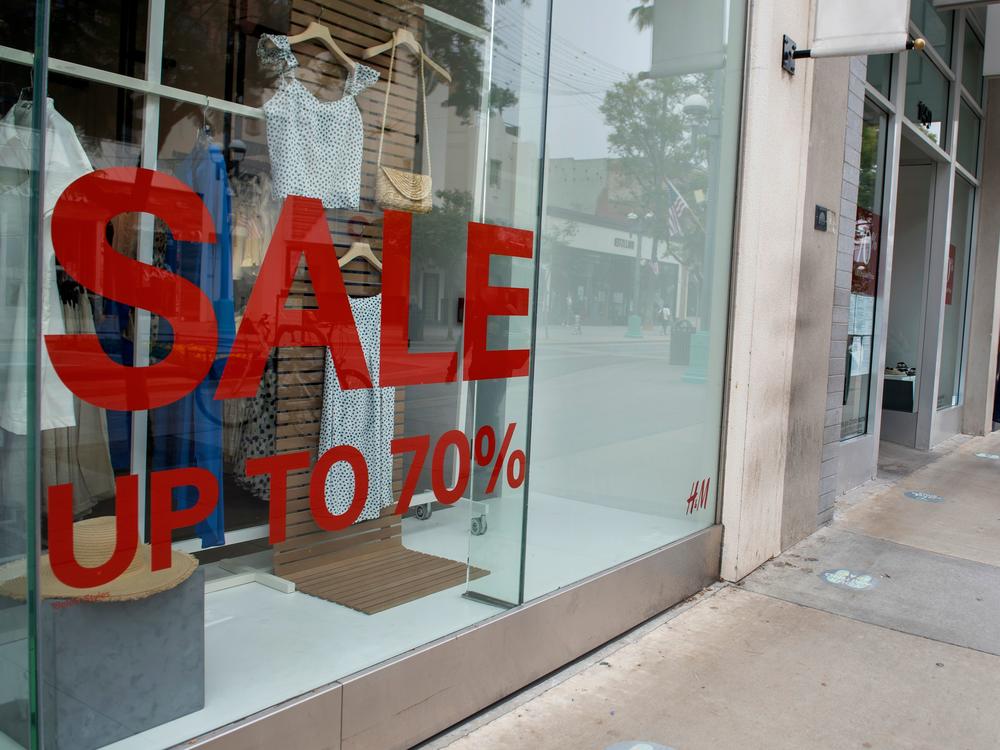Section Branding
Header Content
Last Report Card On U.S. Economy Before Elections Will Be A Blockbuster
Primary Content
On its surface, economic growth data out this week will look like one for the record books. But dig in, and the picture is not as bright.
The Commerce Department is expected to report on Thursday record-setting growth in gross domestic product during the most recent quarter, reflecting pent-up demand as businesses reopened and consumers streamed back into the marketplace.
However, that won't be enough to repair all of the damage done during the spectacular collapse three months earlier.
And with coronavirus infections now on the rise again, growth is likely to slow during the final months of the year, with a new relief bill from Congress seen as highly unlikely before next week's election.
"These are numbers for the record books," said Nariman Behravesh, chief economist at the forecasting firm IHS Markit.
Behravesh, however, was less hopeful about the current quarter.
"If you pull back on a rubber band and let go, it's going to snap back. But then it kind of goes limp after that," he added. "I think we're looking at a very lackluster growth rate" in the fourth quarter of the year.
Forecasters expect the government to report that GDP expanded at least an annualized 30% in July, August and September, in what would ordinarily be seen as a blockbuster.
But the economy also contracted at an annual revised rate of 31.4% in the previous quarter, the sharpest pullback in modern American history.
With less than a week before Election Day, President Trump has been touting the upcoming report as evidence of a strong "V-shaped" recovery, insisting that the economy is bouncing back as quickly as it collapsed.
"Wait till you see that number on GDP," Trump told supporters in Allentown, Pa., on Monday. "We're having a super-V."
But the recovery so far has been wildly uneven. Many companies that produce goods have roughly returned to pre-pandemic levels, but those oriented toward services — especially those that rely on face-to-face interactions with consumers — are still far behind.
"Services have been clobbered," Behravesh said. "Airline traffic: only 30% of what it was a year ago. Hotels: high vacancy rates. Convention centers: empty. Stadiums: empty. These are all bad news for the economy."
Government relief payments that helped cushion the downturn in the spring and early summer have largely run out. A new round of relief is nowhere in sight, even though the economy has recovered only about half of the 22 million jobs that were lost during the spring.
"A lot of these jobs are gone forever," Behravesh said. "That's a very worrisome trend."
As big as this year's swings in GDP have been, the official numbers from the Commerce Department can also be misleading.
The federal government typically reports quarterly changes in GDP as if they were sustained for a full year. In a volatile period like this, that exaggerates both the downturn — and then the subsequent comeback.
In fact, the economy was only 9% smaller during April, May and June than it was previous quarter — historically bad, but not as bad as the annual contraction of 31.4% in the headline number.
Likewise, the third-quarter growth rate is expected to be reported as well above 30%.
But with growth already tapering off as coronavirus infections start to climb again, the real improvement during the quarter will be significantly less than that — likely well short of the 9.9% quarterly growth rate that would be needed to erase the second-quarter decline.
While the pandemic-driven downturn was historically sharp, it was also mercifully short-lived. Monthly data suggest the economy started growing again by May.
"This was the shortest U.S. recession on record," Behravesh said. "This thing lasted two months, which was basically March and April. The next shortest recession was in 1980, which was six months."
But the pace of recovery — and the expectations surrounding it — also matter, and that may deprive Trump of a much-needed political boost ahead of Nov. 3.
When unemployment was at its worst during the spring, economist Jason Furman urged Democrats not to be overconfident. He warned that a rapid rebound in the economy could give a lift to the president, just in time for the November election.
While the economic comeback has been stronger than many forecasters expected, most of those gains came months ago, and economic momentum is now fading. Furman, an economic adviser to former President Barack Obama, said that this may limit the benefit for Trump's reelection hopes.
"From a political perspective, it isn't, just, are you improving, but how is the pace of improvement?" Furman said. "The pace of improvement is slowing. And that, I think, makes it less politically good for President Trump or maybe even politically bad for him."
Copyright 2020 NPR. To see more, visit https://www.npr.org.

